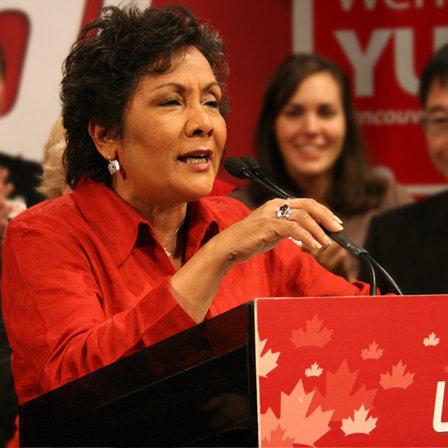Long-time Liberal incumbent Hedy Fry announced her intention to bring a trans rights bill back under her name in the next Parliament.
“It’ll have to get back on the table, and someone has to do it, so I had told them that I would,” Fry says.
The NDP platform has an explicit commitment to moving forward with the aims of C-389, which would have added gender identity and gender expression to both the Human Rights Act and the hate crimes provisions of the Criminal Code. Retiring NDP MP Bill Siksay introduced the bill three times before announcing his retirement earlier this year.
For Fry, this remains the unfinished portion of her commitment to queer issues that she first ran on in 1993.
“The issue for me, actually, in many instances is lack of access to medical interventions and drugs that we see that a lot of the transgendered community aren’t getting,” Fry says. “It’s very spotty across the country, and in some provinces you can get access and in other provinces you cannot. Then that forces those who can afford to, to go to some country where there’s iffy surgery, and I don’t think that’s reasonable and fair given that this is a DSM condition, everyone’s accepted that it’s a medically necessary service that has to be done.”
Fry adds that if the Liberals form a government following the election, she will push to make this bill a piece of government legislation, which will mean faster and easier passage through the machinery of Parliament.
Although a bill to enshrine trans rights in law failed to pass the Senate before the election, that hasn’t stopped grassroots organizers across the country from keeping up pressure during the election.
Identity politics have long kept the trans community from forming and maintaining any kind of national organization, but a number of local groups across the country have made a commitment to come together to press this issue over the course of the election.
“I’ve been doing this for over 10 years, and the idea that three trans people could agree on something is kind of wild,” says Susan Gapka, chair of the Trans Health Lobby Group in Toronto. “But we do agree on some things, like achieving our human rights.”
“There are some differing opinions, but one thing that was agreed was that we’re referring to this as transsexual and transgendered perspectives,” says Mercedes Allen from the Trans Equality Society of Alberta. “I know that some people like to make sure that both are designated so that nobody gets erased.”
Allen explains that the movement remains a grassroots effort, with various groups agreeing to work together to offer trans perspectives to local media and to encourage candidates to voice their support for trans issues.
Bill C-389 received negative media attention after it was called “the bathroom bill” by evangelical lobbyist Charles McVety. Because of that, trans people needed to engage local media, says Gapka.
“We put a human face on the story,” Gapka says. “The public education piece is really important, and there’s some media that are going to portray us negatively, but with more positive stories out there, and putting on the human face, the negative stories will be outnumbered by the positive stories with our efforts, and that’s what’s important.
“Gay and lesbian rights groups have gained momentum, and it took some public education before it became publicly accepted,” Gapka adds.
Egale Canada is doing its part to help with the initiative, says the chair of Egale’s trans committee, Mickey Wilson, in part by helping those groups to share information. Wilson also points to the questionnaire that Egale developed.
“It has some significant questions around trans issues for people to ask candidates in the election,” Wilson says. “Some of the questions directly address C-389 and candidates’ response to it.”
Wilson says that initiatives like the questionnaire will help get candidates to think about trans issues. “For lots of these candidates, it’s probably not even on their radar, so it’s really important that we get the message out there.”


 Why you can trust Xtra
Why you can trust Xtra


